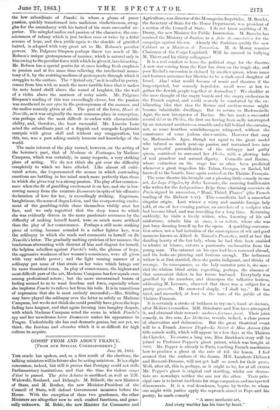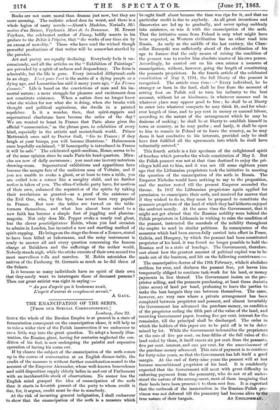.Tune 26, 1863. TER oracle has spoken, and, as a
first result of the elections, the talking ministers will in future also be acting ministers. It is a slight concession, indeed, but still it proves that Persigny could not stifle Parliamentary institutions, and that the time for violent coups d'etat is passed. The fidus Achates is sacrificed, as well as MM. Walewski, Rouland, and Delangle. M. Billault, the new Minister of State, and M. Rouher, the new Minister-President of the Council of State, will defend Government measures before the House. With the exception of these two gentlemen, the other Ministers are altogether new to such exalted functions, and gene- rally unknown, M. Behic, the new Minister for Commerce and Agriculture, was director of the Messageries Imperiales. M. Boudet, the Secretary of State for the Home Department, was president of a section of the Council of State. I do not know anything of M. Duruy, the new Minister for Public Instruction. M. Baroche has received the Ministry of Justice, as a fiche de consolation for the campaign against his son. Already the Parisians qualify the new Cabinet as a Ministere de Transition. M. de Morny remains Chairman of the Corps Legislatif. Will he succeed in bullying M. Thiess and his thirty colleagues?
It is a real comfort to leave the political stage for the theatre. A new star coming from the East has risen on the tragic sky, and poor Rachel's succession is claimed by another queen, whose name and features announce her likewise to be a dark-eyed daughter of Israel. Alas ! what would become of music and theatres if the long-expected, but scarcely hoped-for, recall were at last to gather the Jewish people together at Jermalein ? We shudder at the mere thought of the empty boards and the empty orchestras in the French capital, and could scarcely be comforted by the ex- hilarating idea that then the Bourse and auction-rooms might become inhabitable dwellings. But to return to Mademoiselle Agar, the new interpreter of Racine. She has made a successful second della in Pheilre, the first one having been sadly interrupted by an untoward accident—a stumble and a fall behind the curtains, not, as some heartless scandalmongers whispered, without the connivance of some jealous sister-artists. However that may be, Mademoiselle Agar, though not equal to the great model who infused so much pent-up passion and restrained love into her powerful personification of the unhappy and guilty. queen, contrived to surround her /1W/ire with a glowing halo of real grandeur and natural dignity. Corneille and Racine, whose extinction on the stage has so often been predicted whenever a great tragedian like Tatum, Georges, or Rachel, bid farewell to the boards, have again revived at the Theatre Francais.
The same theatre has brought out a pleasing little comedy in one act, La Loge d'Opjra,by Jules Leconite, the amusing feuilletonist who writes for the ludependance Beige those charming courriers de Paris signed in succession, "Mane, Theca, Pharos" (the French reading of the Hebrew text). This comedietta had a somewhat singular origin. Last winter a witty and amiable foreign lady told, at one of her evening parties, an anecdote of a sculptor who had become blind, and was travelling for a long time. Returning suddenly, he visits a lovely widow, who, knowing of his sad misfortune, admits him at once, it sa toilette, where she was just busy dressing herself up for the opera. A sparkling conversa- tion arises, not a bad imitation of the masterpieces of wit and good manners known as Alfred de Mitsset's Proverbes, until at last the dazzling beauty of the fair lady, whom he had thus been enabled to admire at leisure, extorts a passionate exchunation from the young man. The cataract on his eyes had been removed abroad, and his looks are piercing and lustrous enough. The indiscreet widow is at first startled, then she grows indignant, and thinks of revenge. In consequence, as the lady narrator puts it, she mar- ried the whilom blind artist,. regretting, perhaps, the absence of that convenient defect in her future husband. Everybody was gratified by the anecdote, and thereupon the talkative hostess, addressing M. Lecomte, observed that there was a subject for a pretty proverbe. He answered simply, "I shall try." He has tried, and succeeded, at least to the taste of the public of the Theatre Francais.
It is certainly a stroke of boldness to try one's hand at doctors,
after Moliere's comedies. MM. Brisebarre and N'us have attempted it, and obtained their reward : audaces.fin-tuna feral. Their joint comedy, in five acts, Les Redeeins, reveals, indeed, a close power of observation and delineation. But the great theatrical event will be a French Aurora Floyd—Le Secret de Miss Aurore (the title sounds well), which will appear in a few days at the Theatre du Chatelet. To ensure a long run, Miss Braddon's story will be joined to Professor Pepper's ghost patent, which was bought at 800/. Mr. Pepper is already in Paris, teaching French machinists how to produce a ghost at the rate of 40/. the lesson. I feel assured that the authors of the drama, MM. Lambert-Thiboust and Bernard-Derosue, will not get half as much for their prose. Well, after all, this is, perhaps, as it ought to be, for at all events Mr. Pepper's ghost is original and startling, whilst our drama- tists are nowadays neither the one nor the other. Their prin- cipal care is to invent incidents for stage carpenters and unexpected denouements. It is a real decadence, begun by Scribe, to whom one might with justice apply the reproach aimed at Pope and his poetry, he made comedy "A mere mechanic art, And every warbler has his tune by heart." Books are not more moral than dramas just now, but they are more amusing. The realistic school does its worst, and there is a whole legion of nasty novels :—About's Madelon, Noriad's Me'- moires d'un Balser, Feydeau's Mari de //4 Danseuse. M. Ernest Feydeau, the celebrated author of Fanny, boldly asserts in his preface to the DAiit 2 l' Ope'ra, that "the works of our time sin by an excess of morality." Those who have read the wicked though powerful productions of that writer will be somewhat startled by the paradox.
Art and poetry are equally declining. Everybody feels it un- consciously, and all the articles on the "Exhibition of Paintings" are pervaded by a spirit of sadness and despondency. The form is admirable, but the life is gone. Every intended dithyramb ends in an elegy. L',e1 t pour rort is the motto of a dying people or a dying age, and Lamartine has said it many years ago, "La France s'ennuie." Life is based on the convictions of man and his im- mortal nature ; a mere struggle for pleasure and excitement does not constitute existence. When a nation does no longer know what she wishes for nor what she is doing, when she breaks with thought and political aspirations, she dwells in a painted sepulchre. Is it a wonder, then, that spirit-rappers and supernatural charlatans have become the order of the day? We are wonted to boast in France that Paris alone gives the official "consecration," as the phrase goes, to celebrities of every kind, especially in the artistic and mountebank world. Prince Metternich once said to Doctor Gall, "Go to France ; if they laugh at your bumps, you will become illustrious." Hahnemann once hopefully exclaimed, "If homeopathy is introduced in France it will be safe." The celebrated spirit-medium, Home, seems to be of the same opinion since he made Paris his head-quarters. Mira- cles are now of daily occurrence ; you meet one in every notorious drawing-room. Supernatural exhibitions and apparitions have become the meagre fare of the malicious sons of Voltaire, and if you are unable to evoke a ghost, or at least to turn a table, you are exiled into a corner like a naughty child, and no further notice is taken of you. The ultra-Catholic party have, for motives of their own, enhanced the reputation of the spirits by taking their revelations as granted—as a proof of the existence of the Evil One, who, by the bye, has never been very popular in France. But now the tables are turred on the table- turners themselves, and what has almost been raised to a new faith has become a simple feat of juggling and phantas- magoria. Not only does Mr. Pepper evoke a nearly real ghost, but the clever prestidigitateur Robin, whom you had occasion to admire in London, has invented a new and startling method of spirit-rapping. He brings on the stage the drum of a Zouave, stated to have been killed at Inkermann, and the noisy instrument is ready to answer all and every question concerning the famous charge at Balaklava and the sufferings of the nether world. Nobody stands nigh, while the sticks execute of their own accord the most marvellous rolls and marches. M. Robin astonishes the natives of the Faubourg St. Germain as much as he did those of the Sahara.
Is it because so many individuals have no spirit of their own that they sorely want to interrogate those of deceased persons ?
Then our great satirist was right in saying :— " Au pen d'esprit que le bonhomme avait, L'esprit d'autrui de complement servait."
A GAUL.































 Previous page
Previous page